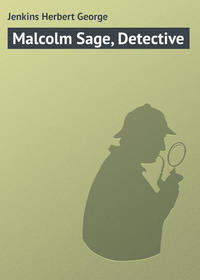
John Dene of Toronto: A Comedy of Whitehall
"I'm not so sure," remarked Malcolm Sage to Thompson who had entered his room soon after Colonel Walton had gone to pay his call at 110, Downing Street, "that the ménage Naylor isn't a subject for investigation by the Food Controller."
Thompson grinned.
"Eighty pounds of potatoes seems to be a generous week's supply for three people."
"And other things to match, sir," said Thompson with another grin. "Haricot beans, cabbage, they're nuts on cabbage, salad and all sorts of things that are not rationed. I think it must be diabetes," he added with another grin.
"Possibly, Thompson, possibly," said Malcolm Sage; "but in the meantime we will assume other explanations. Some people eat more than others. For instance, the German is a very big eater."
"And a dirty one, too, sir," added Thompson with disgust. "I've been at hotels with 'em."
"Seven meals a day is one of the articles of faith of the good German, Thompson," continued Malcolm Sage.
"And what's the result, sir?" remarked Thompson.
"I suppose," remarked Sage meditatively, "it's the same as with a bean-fed horse. They go out looking for trouble."
"And they're going to get it," was the grim rejoinder.
"Well, carry on, Thompson," said Sage by way of dismissal. "You'll learn a great deal about the green-grocery trade in the process."
"And waterworks – and gas and things, sir," grinned Thompson.
As Thompson opened the door of Malcolm Sage's room, he stepped aside to allow Colonel Walton to enter, and then quietly closed the door behind him.
"Bad time?" enquired Sage as Colonel Walton dropped into a chair and, taking off his cap, mopped his forehead.
"On this occasion I resigned for both of us."
For once in his life Malcolm Sage was surprised. He looked incredulously across at his chief, who gazed back with a comical expression in his eyes.
"I thought I was left at home for fear I might resign," said Malcolm Sage drily when Colonel Walton had finished telling him of the interview.
But Colonel Walton did not look up from the end of his cigar, which he was examining with great intentness.
"I'm not a sceptic," remarked Malcolm Sage presently, as he gazed at his brilliantly-polished fingernails, "but I would give a great deal for a dumb patriot domiciled in Apthorpe Road."
"Dumb?" queried Colonel Walton.
Malcolm Sage nodded without raising his eyes from his finger-nails.
"I have no doubt that Apthorpe Road is exclusively patriotic; but if we were to ask one of its residents to lend us a front-bedroom and, furthermore, if we spent all our days in the bedroom at the window – " He shrugged his shoulders.
"There's always the domestic servant," suggested Colonel Walton.
"Not much use in this case, chief," was the reply. "It means that Thompson has had to turn road-mender. Good man, Thompson," he added. "He'd extract facts from a futurist picture."
Colonel Walton nodded.
CHAPTER XVI
FINLAY'S S.O.S
I
"Well, I think it's spies," announced Marjorie Rogers, as she sat perched on the corner of John Dene's table, swinging a pretty foot.
Dorothy looked up quickly. "But – " she began, then paused.
"And it's all Mr. Llewellyn John's fault. He ought to intern all aliens. On raid-nights the Tube is simply disgusting."
Dorothy smiled at the wise air of decision with which Marjorie settled political problems. The strain of the past week with its hopes and fears was beginning to tell upon her. There had been interminable interrogations by men in plain clothes, who with large hands and blunt pencils wrote copious notes in fat note-books. The atmosphere with which they surrounded themselves was so vague, so non-committal, that Dorothy began to feel that she was suspected of having stolen John Dene.
"Oh, mother!" she had cried on the evening of the first day of her ordeal at the hands of Scotland Yard, "you should see your poor, defenceless daughter surrounded by men who do nothing but ask questions and look mysterious. They're so different from Mr. Sage," she had added as an afterthought.
"If it isn't the spies," continued Marjorie, "then what is it?"
Dorothy shook her head wearily. She missed John Dene. It was just beginning to dawn upon her how much she missed him. The days seemed interminable. There was nothing to do but answer the door to the repeated knocks, either of detectives or of journalists. It was a relief when Marjorie ran in to pick her up for lunch – Dorothy had felt it only fair to discontinue the elaborate lunches that were sent in – or on her way home in the evening.
"A man doesn't get lost like a pawn-ticket," announced Marjorie.
"What do you know about pawn-tickets, Rojjie?"
"Oh, I often pop things when I'm hard up," she announced nonchalantly.
"You don't!" cried Dorothy incredulously.
"Of course. What should I do when I'm stoney if it wasn't for uncle."
"You outrageous little creature!" cried Dorothy. "I should like to shake you."
"He's quite a nice youth, with black hair greased into what I think he would call a 'quiff.'"
"What on earth are you talking about?"
"Uncle, of course. He always gives me more than anyone else," she announced with the air of one conscious of a triumph.
"Where will you end, Rojjie?" cried Dorothy.
"Suburbs probably," she replied practically. "These old wasters take you out to dinner; but marry you – not much." She shook her wise little head so vigorously that her bobbed hair shook like a fringe. "I wish I had a John Dene," she said after a pause.
"A John Dene!"
"Ummm!" nodded Marjorie.
"Why?"
"Marry him, of course."
"Don't be absurd."
Suddenly Marjorie slipped off the table and, going over to Dorothy, threw her arms round her impulsively.
"I'm so sorry, Dollikins," she cried, snuggling up against her.
"Sorry for what?" asked Dorothy in a weak voice.
"That he got lost. I – I know," she added.
"Know what?" asked Dorothy, her voice still weaker.
"That you're keen on him."
"I'm not," Dorothy sniffed. "I'm not, so there." Again she sniffed, and Marjorie with the wisdom of her sex was silent, wondering how long she would be able to stand the tickling of Dorothy's tears as they coursed down her cheeks.
At the end of a fortnight Sir Lyster Grayne decided to close John Dene's offices, and Dorothy returned to the Admiralty, resuming her former position; but, thanks to Sir Bridgman North's intervention, her salary remained the same as before John Dene's disappearance.
All the girls were greatly interested in what they called "John Dene's vanishing trick." Dorothy became weary of answering their questions and parrying their not ill-natured impertinences. Sometimes she felt she must scream.
Everybody she encountered seemed to think it necessary to refer to the very subject she would have wished left unmentioned.
One day she had encountered Sir Bridgman North in one of the corridors. Recognising her, he had stopped to enquire if she were still receiving her full salary. Then with a cheery "I don't want to be gingered-up when the good John Dene returns," he had passed on with a smile and a salute.
At home it was the same. A pall of depression seemed to have descended upon the little flat. Mrs. West tactfully refrained from asking questions; but Dorothy was conscious that John Dene was never very far from her thoughts.
Their week-end excursions had lost their savour, and they both recognised how much John Dene had become part of their lives.
Sometimes when Dorothy was in bed, tears would refuse to be forced back, however hard she strove against them. Then she would become angry with herself, jump out of bed, dab her eyes with a wet towel, and return to bed and start counting sheep, until the very thought of mutton seemed to drive her mad.
Mr. Blair she hated the sight of, he was so obviously satisfied with the course of events. Sometimes she found herself longing for the return of John Dene, merely that he might "ginger-up" Sir Lyster's private secretary.
Week after week passed and no news. The volume of questions in the House died down and finally disappeared altogether. The state of affairs at Scotland Yard returned to the normal. Newspapers ceased to refer either to John Dene, or to his disappearance, and the tide of war flowed on.
Marshal Foch had struck his great blow, and had followed it up with others. The stream of Hun invasion had been stemmed, and slowly France and Belgium were being cleared.
Mr. Montagu Naylor's comings and goings continued to interest Department Z., and Apthorpe Road was still in the grip of the workman.
Day by day Dorothy seemed to grow more listless. It was the heat, she explained to Mrs. West, whilst Marjorie nodded her wise little head, but said nothing. Whenever she saw Dorothy she always "talked John Dene," as she expressed it to herself. She could see that it was a relief.
"You see, Rojjie darling, I should always be a little afraid of him," said Dorothy one day as they sat in John Dene's room. "I suppose that is why I – " She paused.
Marjorie nodded understandingly, and continued to swing a dainty, grey-stockinged leg.
"You – you see," continued Dorothy a little wistfully, "I've always had to do the taking care of, and he – " Again she broke off. Then suddenly jumping up she cried, "Let's go to the pictures. Bother John Dene!" and Marjorie smiled a little smile that was really her own.
Finally there came the time when for a fortnight Dorothy would have no one to say to her either "come" or "go," and she and Mrs. West went to Bournemouth, Dorothy inwardly dreading two weeks with nothing to do.
II
Whilst the John Dene sensation was slowly fading from the public mind, Malcolm Sage was continuing with unabated energy the task he had set himself. He was aware that Finlay was being watched even more closely than John Dene had been watched, and Sage realised that it was, in all probability, impossible for him to communicate with headquarters.
By an ingenious device, however, Finlay had at length succeeded in establishing contact with Department Z. It had been reported to Sage that on two occasions Finlay had been seen to leave behind him at restaurants a silver-mounted ebony walking stick. He had, however, always returned for it a few minutes later, as if having discovered his loss.
Learning that the stick was of an ordinary stock pattern, Malcolm Sage gave instructions for one exactly like it to be purchased. An endeavour was then to be made to effect an exchange with that carried by Finlay. It was not until a week later that this was effected, and the stick handed to Thompson.
A careful examination disclosed nothing. The silver nob and ferrule were removed; but without bringing to light anything in the nature of a communication.
"It's a wash-out, sir," said Thompson, as he entered Malcolm Sage's room, the stick in one hand and the knob and ferrule in the other.
Sage glanced up from his desk. Holding out his hand he took the stick and proceeded to examine it with elaborate care. The wood at the top, just beneath the knob, had been hollowed out. Sage glanced up at Thompson interrogatingly.
"Nothing in it, sir," he said, interpreting the question.
"There will be when you next make the exchange," was the dry retort and, with a motion of dismissal, Malcolm Sage returned to the papers before him.
"What's the matter, Tommy?" enquired Gladys Norman a few minutes later, as she came across Thompson gazing at the hollowed-out end of a stick, and murmuring to himself with suppressed passion.
"I'm the biggest fool in London," said Thompson without looking up.
"Only just discovered it?" she asked casually. "Poor old Tommikins," she added, prepared to dodge at the least sign of an offensive movement on the part of her colleague; but Thompson was too engrossed in introspective analysis to be conscious of what was taking place about him.
"We're on the eve of developments," said Malcolm Sage one afternoon some weeks later, as Colonel Walton entered his room, closing the door behind him.
"Anything new?" he enquired, dropping into a chair beside Sage's table.
"I'm afraid there's going to be trouble."
"Not resigning?" there was a twinkle in Colonel Walton's eye. In their infinite variety the resignations of Malcolm Sage would have filled a Blue Book.
"I don't like the look of things," continued Sage, pulling steadily at his pipe and ignoring the remark. "Naylor's playing his own game, I'm sure and," he added, looking up suddenly, "it's an ugly game."
"Bluff, that accusing Finlay of acting on his own about John Dene."
Malcolm Sage nodded his head slowly several times. For some minutes he continued to smoke with a mechanical precision that with him always betokened anxiety.
"It's the dug-out business, I don't like," he said at length.
Colonel Walton nodded. "You think?" he queried.
Sage nodded, his face was unusually grave.
During the previous week it had been discovered that Mr. Naylor was having constructed in his back-garden a dug-out, to which to retire in case of air-raids, and he was himself assisting with the work of excavation.
Finlay had confirmed Malcolm Sage's suggestion that Naylor was suspicious. There had been a quarrel between the two, which had taken place through intermediaries. Naylor had accused Finlay of being responsible for the disappearance of John Dene. Finlay had responded by a like accusation, and the threat of serious consequences to Naylor when the facts were known in a certain quarter.
"We've got to speed up." Malcolm Sage addressed the remark apparently to the thumbnail of his left hand.
Colonel Walton nodded.
"I don't like that dug-out business at all," continued Sage. "The changing of the site too," he added.
"Had they got far with the first one?" enquired Colonel Walton
"About five feet down; but they haven't filled it in yet."
Colonel Walton looked up quickly. His face was grave.
"Naylor says they must get the dug-out finished first in case of a raid. He can fill in the old hole at any time."
"A dug-out after nearly four years of raids?"
"Exactly," said Sage, "that and the unfilled hole and Naylor's own activities – " He broke off significantly.
"About the reward? It would be awkward if – Come in."
Colonel Walton broke off at the sound of a knock at the door.
Thompson entered with an ebony walking stick in one hand, a silver knob and a small piece of paper in the other. He held out the paper to Malcolm Sage, who, with a motion of his head, indicated Colonel Walton. He was very punctilious in such matters. Colonel Walton took the slip of paper and read aloud.
"Arrest me late to-night and have me taken to Tower. Slip the dogs to-morrow certain, delay dangerous.
J. F."
For fully a minute the three men were silent. Colonel Walton began to draw diagrams upon his blotting pad Malcolm Sage gazed at his finger-nails, whilst Thompson stood stiffly erect, his face pale and his mouth rigid. Presently Sage looked up.
"I'm afraid there'll be no spring-mattress for you to-night, Thompson," he said. "I'll ring in a few minutes," and Thompson drew a sigh of relief as he turned towards the door, which a moment afterwards closed behind him.
"We can't do it to-night," announced Sage with decision.
Colonel Walton shook his head.
"He must take the risk until the morning," continued Sage. "You'll be here until it's all through?" he interrogated.
Colonel Walton nodded. When thoughtful he was more than usually sparing of words.
"About the reward?" he interrogated, as Sage rose and moved towards the door.
"We'll withdraw it in to-morrow evening's papers," was the response, "if you agree."
Again Colonel Walton nodded, and Malcolm Sage went out, bent on reminding Scotland Yard of his existence.
CHAPTER XVII
MALCOLM SAGE CASTS HIS NET
I
"I'm afraid there'll be trouble with the people at the Tower," remarked Malcolm Sage, who, with the aid of his briar pipe, was doing his best to reduce the visibility.
"Zero is noon," mused Colonel Walton.
Sage nodded.
"They'll begin to drift in about twelve-thirty," he continued, puffing placidly at his cigar.
"Well, it's been interesting, and it'll give the Skipper a sort of joy day with the War Cabinet," said Sage quietly. "To-morrow ought to be rather a large breakfast-party," he added drily.
"He had the wind up rather badly at one time."
"Celt," was Sage's comment.
Colonel Walton nodded.
For some minutes the two smoked in silence.
"I hope they won't start any of that O.B.E. business," said Sage at length.
"Sure to. It will be a triumph for the Skipper," continued Colonel Walton.
"He deserves it," said Sage ungrudgingly. "He's always believed in us. By the way, I told Hoyle to bring Finlay here after they had got Naylor."
Colonel Walton continued to puff contentedly at his cigar.
Early that morning Malcolm Sage had given final instructions to the various members of his staff. He and Colonel Walton had been working all through the night in perfecting their plans. The demands made upon Scotland Yard for men had at first evoked surprise, which later developed into sotto voce ridicule.
"What the devil's up with old Sage and Onions?" Inspector Crabbett had muttered, as he cast his eyes down the list of plain-clothes and uniformed officers required. "Who the devil's going to issue all these warrants?"
Department Z., however, had its own means of obtaining such warrants as were required without questions being asked.
Early that morning Malcolm Sage had got through to Inspector Crabbett.
"That you, Inspector?" he enquired.
"What's left of me," was the surly retort.
"Got that little list of mine?" enquired Sage.
"We're engaging new men as fast as we can so as to have enough," was the grumbling reply. "I've asked the W.O. to demobilise a few divisions to help us," he added with ponderous sarcasm.
"Thank you," said Sage imperturbably, as he replaced the receiver.
Mr. Montagu Naylor had been reserved for Department Z. Sage was determined to get him alive; but his knowledge of the man was sufficient to tell him that Mr. Naylor was equally determined never to be taken alive. He had seen that little corrugated-iron covered building at the Tower that had once been a miniature rifle-range and, involuntarily, he had shuddered.
II
"Was that the telephone?"
Mr. Naylor barked the question down from the first-floor. There was a pad-pad of feet, and Mrs. Naylor appeared from the basement.
"Yes," she replied timidly. "Shall I go?"
"No, I'll go myself;" and Mr. Naylor descended the stairs heavily. Passing into his study, he closed the door behind him and seated himself at the table.
"Hullo!" he called into the mouthpiece, lifting off the receiver.
"Is that twelve Haymarket?" came the reply.
"No," was the suave response. "This is Mr. Montagu Naylor of Apthorpe Road, Streatham. You're on to the wrong number;" and with that he replaced his receiver, pulled out his watch and scowled at the dial. The hands pointed to half-past eleven.
With a muttered exclamation and a murmur about a taxi, Mr. Naylor stamped out of the room, just as Mrs. Naylor was leaving the dining-room. She shrank back as if expecting to be struck.
"Back about two," he grunted. "Keep that damned dog tied up."
"I'll see to it," said Mrs. Naylor in a voice that seemed to come through cotton-wool.
Since post time that morning Mr. Naylor's temper had been bad, even for him. An intimation had come from the local police-station to the effect that several complaints had been made of the savage nature and aggressive disposition of a dog he was alleged to keep on his premises. The officer who had been sent round to call attention to this fact on the previous day, had been prevented from entering the garden by the valiant defence put up by James himself. Mr. Naylor had been out at the time of the call, and Mrs. Naylor had not dared to tell him of the constable's visit and discomfiture. Department Z. was taking no risks where James was concerned.
During the whole of breakfast strange sounds had rumbled in Mr. Naylor's throat, whilst on one occasion, when he happened to catch Mrs. Naylor's eye, he glared so ferociously at her that she let the lid of the teapot fall with a crash into a fast-filling cup. With this the volcano had burst, and the grumbles in Mr. Naylor's larynx matured into deep-throated oaths and execrations.
Three times he had descended to the basement, from whence his voice could be heard in passionate protest against any and every thing he encountered. Mrs. Naylor had gone about the house with the air of one convinced of disaster. Susan, as usual, succeeded in shuffling out of the way just as Mr. Naylor appeared.
As the front door banged behind him, Mr. Naylor's scowl lifted as by magic, giving place to an expression of benignant geniality befitting a prominent and respected citizen.
Mr. Naylor managed the distance to the Haymarket in the time without involving a taxi, thus greatly improving his temper. He was a man who grudged unnecessary expense, and all expense, not directly connected with the delights of the table, was to his way of thinking unnecessary.
That morning, just as Big Ben was booming out the tenth stroke of noon, a commotion was observed to take place outside the Pall Mall Restaurant. Suddenly four men precipitated themselves upon a fifth, who was walking calmly and peaceably towards Coventry Street. In a flash he was handcuffed and thrown, somebody called out "Police"; but before anyone had properly realised what was happening, a motor-car had drawn up and the handcuffed man was bundled into it, struggling vainly against the rope with which his legs had been quickly bound. When a policeman arrived, it was to be told by an excited group of spectators that a man had been assaulted and kidnapped in broad daylight.
Thus was Mr. Montagu Naylor of Streatham secured and conducted to the Tower, there eventually to make acquaintance with the miniature rifle-range.
Whilst Mr. Naylor was rapidly nearing the place of the most remarkable appointment he had ever kept, James was reduced to a state of frenzy by several strange men in the adjoining back-gardens. They were, according to their own account, given to the residents whose houses flanked that of Mr. Naylor, engaged upon survey work. The instruments they had with them seemed to give colour to their words. The apathy of the workmen who for the last few days had surrendered Apthorpe Road to others, different from themselves only in that they belonged to another union and brought with them a steam-roller instead of picks and shovels, seemed suddenly to develop into an unusual activity. Immediately after the departure of Mr. Naylor, the asphalt of the footpath just in front of his gate was picked up with an energy that merited rebuke from any self-respecting father of the chapel. A few minutes later a man knocked at Mr. Naylor's door, and stated that it would be necessary to dig up the path leading to the front door.
At this information a look of fear sprang into Mrs. Naylor's eyes. She was terrified of deciding anything in Mr. Naylor's absence. When the men announced that it would be necessary to descend to the basement, she shook her head violently.
"No, no!" she cried. "Mr. Naylor is away. Come again this afternoon."
It was pointed out to her that the afternoon might be too late, something had gone wrong with the gas, and if they waited until the afternoon anything might happen.
The man was respectful, but insistent. He so played upon Mrs. Naylor's fears by hinting darkly at the possibility of there being nothing for Mr. Naylor to return to by the afternoon, unless the gas meter were immediately seen to, that she consented to allow a man to descend to the basement after being told that it would not be necessary for him to go into any of the rooms.
First, however, she insisted that she must go down and see that everything was tidy. After a lapse of five minutes she returned; but when four men presented themselves prepared to descend the stairs, she resolutely refused.
"Very well, mum," said the foreman, "we'll see what the police can do. Just pop round to the police-station, Bill, and bring a copper," he said to a mate. "Sooner 'ave the 'ole bloomin' street blown up than let us go down and dirty your stairs." There was in his voice all the indignation of the outraged British workman.







